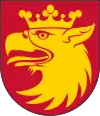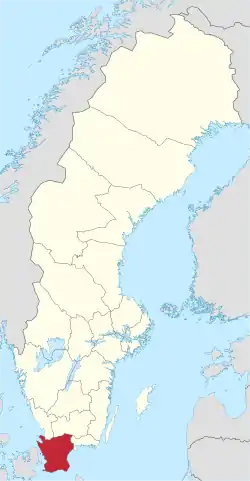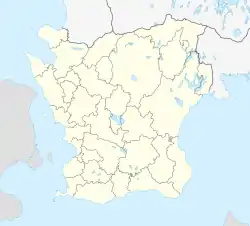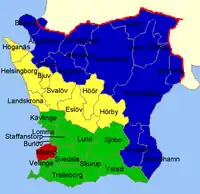Skåne County
Skåne County (Swedish: Skåne län [ˈskôːnɛ ˈlɛːn]), sometimes referred to as Scania County in English, is the most southern county, or län, of Sweden, basically corresponding to the traditional province Scania. It borders the counties of Halland, Kronoberg and Blekinge and connects to Capital Region, Denmark by the Öresund Bridge. The seat of residence for the Skåne Governor is the city of Malmö. The headquarters of Skåne Regional Council are located in both Kristianstad and Malmö.[4]
Skåne County
Skåne län Scania County | |
|---|---|
 Flag  Coat of arms | |
 Skåne County in Sweden | |
 Location map of Skåne County in Sweden | |
| Coordinates: 55°59′43″N 13°26′30″E | |
| Country | |
| Founded | 1 January 1997 |
| Capital | Malmö, Kristianstad |
| Municipalities | 33
|
| Government | |
| • Governor | Anneli Hulthén |
| • County Council | Skåne Regional Council |
| Area | |
| • Total | 11,302.77 km2 (4,364.02 sq mi) |
| Population (December 31, 2021)[2] | |
| • Total | 1,402,425 |
| • Density | 120/km2 (320/sq mi) |
| Time zone | UTC+1 (CET) |
| • Summer (DST) | UTC+2 (CEST) |
| ISO 3166 code | SE-M |
| Nominal GRDP | SEK 531 billion (2017)[3] |
| Nominal GRDP per capital | SEK 398,000 (2017)[3] |
| NUTS Region | SE224 |
| Website | |

The present county was created in 1997 when Kristianstad County and Malmöhus County were merged; it covers around 3% of Sweden's total area, while its population of 1.3 million comprises 13% of Sweden's total population. Prince Oscar is Duke of Skåne.
Endonym and exonym
When the new county was established in 1997, it was named Skåne län as its borders coincide with those of the province Skåne. In English, the county as well as the province are sometimes known as Scania, but the name Skåne is more frequently used, e.g. by the county administrative board.[5][6]
Heraldry
The coat of arms for Skåne County is the same as for the province of Skåne, only with the tinctures reversed and the crown, beak and tongue of the griffin in the same color. When the arms are shown with a royal crown, it represents the County Administrative Board, which is the regional presence of (royal) government authority. Blazon: "Gules, a Griffin's head erased Or, crowned and armed the same."
Provinces
Skåne County is the administrative equivalent of the province of Skåne, but it also includes an insignificant part of the province of Halland.
Administration
Skåne County is administered by Region Skåne, one of the 20 county councils of Sweden. Its main responsibilities are for the public healthcare system and public transport. In addition, it has for a trial period assumed certain tasks from the County Administrative Board. The two former administrative county councils of the province of Skåne shown on the map, Kristianstad County and Malmöhus County, which were established in 1719, were merged in 1997, forming the present county with boundaries that are almost identical to the boundaries of the province.
The seat of residence for the Governor (landshövding) is the city of Malmö. The County Administrative Board is a Government Agency headed by a Governor. See List of Skåne Governors.
County council
Region Skåne is an evolved County Council, which was established in 1999 when the County Councils of the former counties were amalgamated.
Its county or regional assembly is the region's highest political body, and its members are elected by the electorate,[7] as opposed to the county administrative board, that guards the national interests in the county under the chairmanship of the county governor (landshövding in Swedish).
Municipalities

Skåne County contains 33 municipalities[8] (Swedish: kommuner), the largest by population being Malmö Municipality (340,000 inhabitants), Helsingborg Municipality (145,000), Lund Municipality (123,000 inhabitants) and Kristianstad Municipality (85,000 inhabitants). The municipalities have municipal governments, similar to city commissions, and are further divided into parishes. The parish division is traditionally used by the Church of Sweden, but also serves as a divisioning measure for Swedish census and elections.
- Bjuv
- Bromölla
- Burlöv
- Båstad
- Eslöv
- Helsingborg
- Hässleholm
- Höganäs
- Hörby
- Höör
- Klippan
- Kristianstad
- Kävlinge
- Landskrona
- Lomma
- Lund
- Malmö
- Osby
- Perstorp
- Simrishamn
- Sjöbo
- Skurup
- Staffanstorp
- Svalöv
- Svedala
- Tomelilla
- Trelleborg
- Vellinge
- Ystad
- Åstorp
- Ängelholm
- Örkelljunga
- Östra Göinge
Elections
Riksdag
The table details all Riksdag elections held in the area currently constituting Skåne County since the unicameral era began in 1970. Although both were rounded to 49.3 under one decimal, the leftist bloc had 49.33 to 49.25% for the centre-right bloc in the 1970 election.
| Year | Votes | V | S | MP | C | L | KD | M | SD | NyD | Left | Right |
|---|---|---|---|---|---|---|---|---|---|---|---|---|
| 1970[9] | 617,147 | 2.1 | 47.2 | 20.0 | 15.3 | 1.2 | 14.0 | 49.3 | 49.3 | |||
| 1973[10] | 641,980 | 2.8 | 45.0 | 26.5 | 7.7 | 1.0 | 16.7 | 47.8 | 50.9 | |||
| 1976[11] | 676,741 | 2.6 | 43.0 | 22.8 | 11.2 | 0.8 | 19.3 | 45.6 | 53.3 | |||
| 1979[12] | 677,896 | 3.2 | 42.7 | 15.3 | 11.4 | 0.7 | 25.9 | 45.9 | 52.6 | |||
| 1982[13] | 688,331 | 3.3 | 45.0 | 1.6 | 13.8 | 6.0 | 1.0 | 29.0 | 48.2 | 48.9 | ||
| 1985[14] | 687,808 | 3.1 | 43.3 | 1.5 | 10.4 | 14.0 | 27.1 | 46.5 | 51.6 | |||
| 1988[15] | 667,533 | 3.5 | 43.3 | 5.8 | 9.6 | 11.0 | 1.7 | 23.8 | 52.5 | 44.4 | ||
| 1991[16] | 680,256 | 2.7 | 35.9 | 3.0 | 6.6 | 8.0 | 5.9 | 28.0 | 6.9 | 38.6 | 48.4 | |
| 1994[17] | 693,113 | 3.7 | 45.5 | 4.0 | 6.3 | 6.1 | 3.0 | 27.4 | 1.7 | 53.3 | 42.9 | |
| 1998[18] | 653,092 | 8.2 | 37.3 | 3.6 | 4.0 | 4.4 | 10.2 | 27.8 | 49.0 | 46.4 | ||
| 2002[19] | 665,232 | 6.0 | 39.8 | 3.8 | 4.3 | 13.8 | 7.8 | 18.1 | 3.6 | 49.6 | 44.0 | |
| 2006[20] | 707,231 | 3.9 | 33.7 | 4.5 | 6.0 | 8.4 | 5.0 | 29.6 | 5.7 | 42.0 | 48.9 | |
| 2010[21] | 761,223 | 3.9 | 26.7 | 6.7 | 5.1 | 7.6 | 4.2 | 34.5 | 9.0 | 37.3 | 51.3 | |
| 2014[22] | 797,657 | 4.4 | 28.3 | 6.8 | 4.7 | 5.7 | 3.4 | 24.7 | 17.9 | 39.5 | 38.5 | |
| 2018[23] | 840,110 | 6.4 | 25.2 | 4.3 | 6.8 | 5.7 | 5.3 | 21.4 | 23.4 | 42.7 | 55.7 |
Regional

The county is divided into four parliamentary constituencies or electoral districts, electing 47 of the 349 members of the Riksdag. Each district is made up of one or more municipalities.
In the 2018 general election, the Sweden Democrats performed particularly well in Skåne County, having the highest number of voters in 21 out of the county's 33 municipalities.[24]
Overall representation in the Riksdag during the 2018–2022 mandate period was as follows:[25]
| Party | Seats | ± | |
|---|---|---|---|
| Social Democratic | 12 | −1 | |
| Sweden Democrats | 11 | +2 | |
| Moderate Party | 9 | −4 | |
| Centre Party | 4 | +2 | |
| Liberals | 4 | – | |
| Christian Democrats | 3 | +1 | |
| Left Party | 2 | +1 | |
| Green Party | 2 | −2 | |
| Total | 47 | −1 | |
Localities in order of size
The ten most populous localities of Skåne County in 2020 were:[26]
| Locality | Population |
|---|---|
| Malmö | 325,069 |
| Helsingborg | 113,828 |
| Lund | 94,393 |
| Kristianstad | 41,299 |
| Landskrona | 33,466 |
| Trelleborg | 30,808 |
| Ängelholm | 29,490 |
| Ystad | 20,195 |
| Eslöv | 19,794 |
| Hässleholm | 19,435 |
The ten largest municipalities of the county by total area are:[27]
| Municipality | Size (km2) |
|---|---|
| Kristianstad | 1,820.76 |
| Hässleholm | 1,307.43 |
| Simrishamn | 1,254.90 |
| Ystad | 1,184.41 |
| Trelleborg | 1,176.64 |
| Båstad | 881.91 |
| Vellinge | 707.87 |
| Höganäs | 676.26 |
| Osby | 598.84 |
| Skurup | 511.60 |
Demographics
Foreign background
SCB have collected statistics on backgrounds of residents since 2002. These tables consist of all who have two foreign-born parents or are born abroad themselves.[28] The chart lists election years and the last year on record alone.
| Location | 2002 | 2006 | 2010 | 2014 | 2018 | 2019 |
|---|---|---|---|---|---|---|
| Bjuv | 18.3 | 20.8 | 24.7 | 26.1 | 31.9 | 32.9 |
| Bromölla | 9.8 | 10.8 | 12.9 | 15.6 | 20.1 | 20.7 |
| Burlöv | 24.8 | 30.0 | 36.2 | 39.5 | 44.3 | 45.4 |
| Båstad | 8.3 | 9.1 | 11.0 | 13.0 | 14.2 | 16.4 |
| Eslöv | 14.7 | 16.3 | 17.3 | 20.3 | 24.3 | 25.0 |
| Helsingborg | 20.2 | 22.6 | 25.9 | 29.1 | 34.2 | 35.2 |
| Hässleholm | 9.9 | 12.0 | 14.6 | 16.9 | 20.7 | 21.2 |
| Höganäs | 9.9 | 10.9 | 12.4 | 13.7 | 16.4 | 17.0 |
| Hörby | 7.8 | 9.7 | 12.0 | 13.5 | 15.9 | 15.9 |
| Höör | 9.6 | 11.0 | 12.5 | 13.0 | 14.8 | 14.9 |
| Klippan | 11.5 | 13.2 | 16.3 | 17.6 | 22.6 | 23.3 |
| Kristianstad | 11.5 | 14.0 | 17.6 | 21.2 | 24.0 | 24.8 |
| Kävlinge | 8.3 | 9.2 | 10.0 | 11.0 | 13.2 | 13.5 |
| Landskrona | 24.9 | 28.4 | 31.6 | 33.9 | 36.5 | 36.8 |
| Lomma | 7.7 | 8.0 | 9.2 | 9.8 | 12.0 | 12.5 |
| Lund | 17.1 | 18.3 | 21.5 | 23.4 | 26.9 | 27.7 |
| Malmö | 32.0 | 35.9 | 40.2 | 42.6 | 45.9 | 46.7 |
| Osby | 8.8 | 10.5 | 13.3 | 15.8 | 20.6 | 20.9 |
| Perstorp | 16.7 | 18.3 | 22.7 | 24.6 | 30.6 | 31.5 |
| Simrishamn | 7.0 | 8.5 | 9.7 | 11.7 | 15.2 | 15.3 |
| Sjöbo | 6.1 | 8.1 | 9.7 | 11.0 | 12.7 | 12.9 |
| Skurup | 8.7 | 10.8 | 12.4 | 13.4 | 16.4 | 16.8 |
| Staffanstorp | 10.6 | 11.6 | 13.6 | 15.0 | 17.8 | 19.1 |
| Svalöv | 11.5 | 12.7 | 14.7 | 17.6 | 21.7 | 22.7 |
| Svedala | 8.3 | 9.6 | 11.0 | 11.6 | 14.9 | 15.7 |
| Tomelilla | 6.8 | 8.3 | 10.4 | 12.1 | 15.4 | 16.1 |
| Trelleborg | 15.2 | 16.7 | 18.4 | 19.9 | 22.5 | 23.0 |
| Vellinge | 6.5 | 7.5 | 8.8 | 9.6 | 11.4 | 11.4 |
| Ystad | 8.0 | 8.9 | 9.7 | 10.6 | 12.9 | 13.0 |
| Åstorp | 17.8 | 21.1 | 24.9 | 27.8 | 33.3 | 33.8 |
| Ängelholm | 9.0 | 9.9 | 11.5 | 13.1 | 15.7 | 16.0 |
| Örkelljunga | 11.3 | 13.4 | 15.9 | 17.8 | 21.6 | 22.4 |
| Östra Göinge | 8.0 | 9.2 | 10.1 | 14.5 | 22.9 | 23.5 |
| Total | 17.6 | 19.9 | 23.1 | 25.4 | 29.0 | 29.7 |
| Source: SCB [28] | ||||||
Transport
The motorway built between Malmö and Lund in 1953 was the first motorway in Sweden. With the opening of the Öresund Bridge between Malmö and Copenhagen (the longest combined road and rail bridge in Europe) in 2000, the Swedish motorways were linked with European route E20 in Denmark, and the two countries' railway systems were physically connected. Before the bridge was built there were train ferries operated between Helsingborg and Helsingør. There are also train ferries to and from Germany and Poland.
Skåne has three major public airports, Malmö Airport, Ängelholm–Helsingborg Airport and Kristianstad Airport. One of the oldest airports in the world still in use is located in Skåne, namely Ljungbyhed Airport, in operation since 1910. Starting in 1926, the Swedish Air Force used the airport for flight training, and up until the military school was moved to the nearby Ängelholm F10 Wing in 1997, the airport was extremely busy. In the late 1980s, it was Sweden's busiest airport, with a record high of more than 1,400 take-offs and landings per day.[29]
The major ports of Skåne are Trelleborg, Ystad, Åhus, Copenhagen Malmö Port, Landskrona Harbour and Helsingborg Harbour. Ferry connections across the Baltic Sea operate from several smaller ports as well.
References
- "Land- och vattenareal i kvadratkilometer efter region, arealtyp och år" (in Swedish). Statistics Sweden. Retrieved 2019-08-07.
- "Folkmängd i riket, län och kommuner 30 september 2017 och befolkningsförändringar 1 juli–30 september 2017. Totalt". Statistics Sweden. 2017-11-08. Archived from the original on 1 December 2017. Retrieved 2017-11-19.
- "Bruttoregionprodukt (BRP), sysselsatta och löner (ENS2010) efter region, tabellinnehåll och år" (in Swedish). Statistics Sweden. Retrieved 2019-08-07.
- "Koncernkontoret" (in Swedish). Region Skåne. Retrieved 2019-08-07.
- "County Administrative Board". www.lansstyrelsen.se. Retrieved 10 May 2021.
{{cite web}}: CS1 maint: url-status (link) - "Skån county and province". britannica.com. Retrieved 10 May 2021.
{{cite web}}: CS1 maint: url-status (link) - Region Skåne. Democracy-Increased autonomy Archived 2004-10-23 at archive.today. Official site. Retrieved 24 August 2007.
- "Snabbfakta of Skåne" (in Swedish). Skåne Regional Council. Retrieved 2019-07-08.
- "Riksdagsvalet 1970" (PDF) (in Swedish). SCB. Retrieved 27 September 2021.
- "Riksdagsvalet 1973" (PDF) (in Swedish). SCB. Retrieved 14 September 2021.
- "Riksdagsvalet 1976" (PDF) (in Swedish). SCB. Retrieved 14 September 2021.
- "Riksdagsvalet 1979" (PDF) (in Swedish). SCB. Retrieved 14 September 2021.
- "Riksdagsvalet 1982)" (PDF) (in Swedish). SCB. Retrieved 14 September 2021.
- "Riksdagsvalet 1985" (PDF) (in Swedish). SCB. Retrieved 14 September 2021.
- "Riksdagsvalet 1988)" (PDF) (in Swedish). SCB. Retrieved 14 September 2021.
- "Riksdagsvalet 1991" (PDF) (in Swedish). SCB. Retrieved 14 September 2021.
- "Riksdagsvalet 1994" (PDF) (in Swedish). SCB. Retrieved 14 September 2021.
- "Riksdagsvalet 1998" (PDF) (in Swedish). SCB. Retrieved 14 September 2021.
- "Valresultat Riksdag 2002" (in Swedish). Valmyndigheten. Retrieved 14 September 2021.
- "Allmänna val 17 september 2006" (in Swedish). Valmyndigheten. Retrieved 14 September 2021.
- "Röster - Val 2010" (in Swedish). Valmyndigheten. Retrieved 14 September 2021.
- "Röster - Val 2014" (in Swedish). Valmyndigheten. Retrieved 14 September 2021.
- "Röster - Val 2018" (in Swedish). Valmyndigheten. Retrieved 14 September 2021.
- Orange, Richard (11 September 2018). "Sweden Democrats biggest in two-thirds of Skåne districts". The Local. Retrieved 11 September 2018.
- "Mandatfördelning" (in Swedish). Valmyndigheten. 2018-11-06.
- "Folkmängd per tätort efter region och vart 5:e år" (in Swedish). Statistics Sweden. Retrieved 2019-08-07.
- "Land- och vattenareal i kvadratkilometer efter region, arealtyp och år" (in Swedish). Statistics Sweden. Retrieved 2019-08-07.
- "PxWeb - välj variabler och värden" (in Swedish). SCB. Retrieved 11 August 2020.
- "Ljungbyheds Militärhistoriska Museum" (in Swedish). Retrieved 2019-07-08.